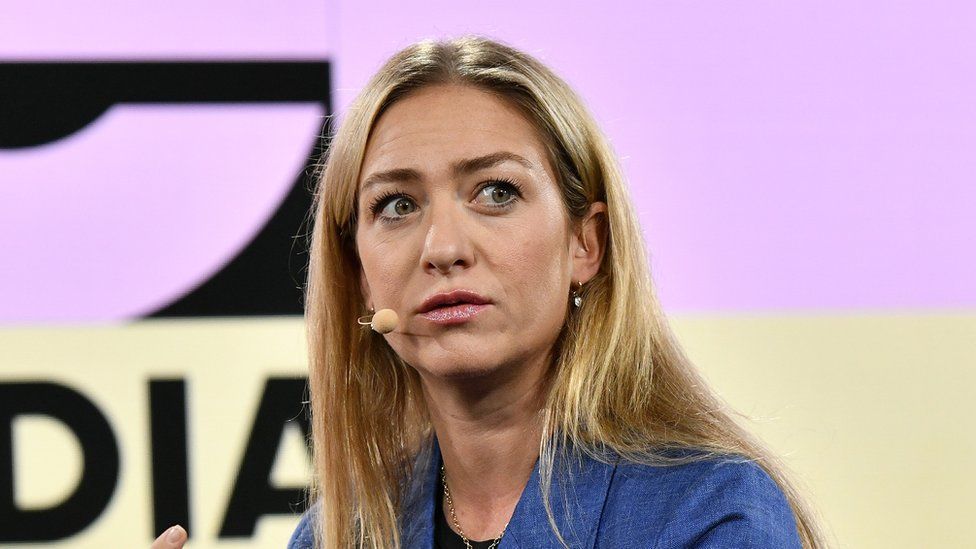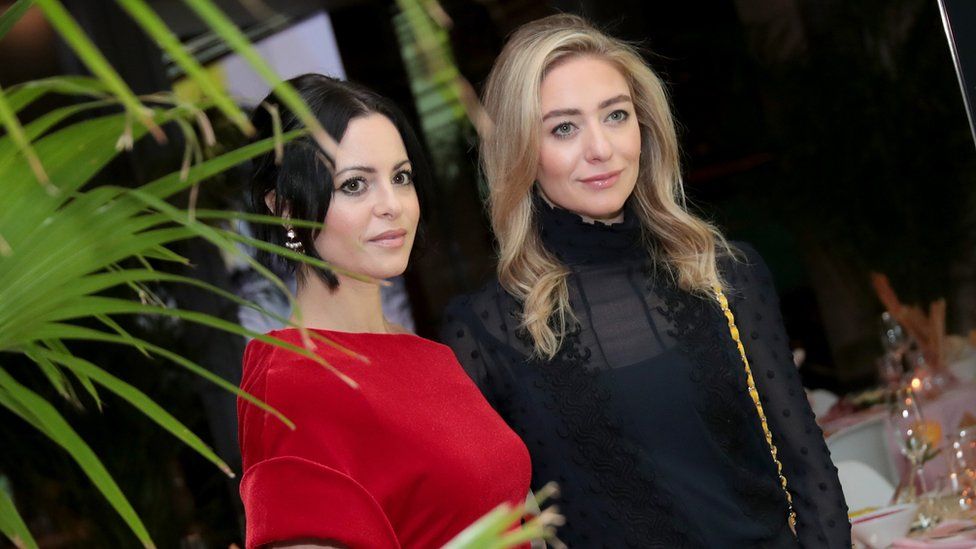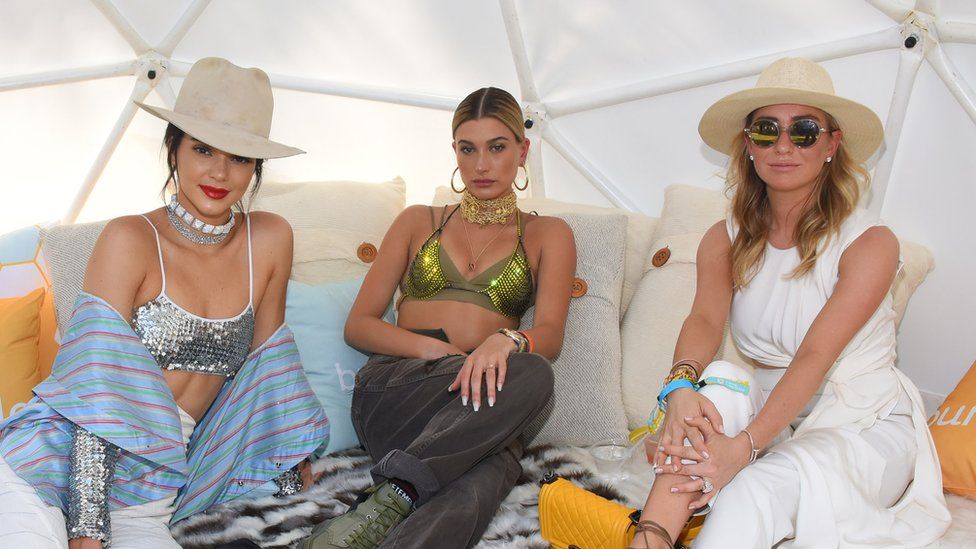
Out of adversity comes opportunity, so the saying goes.
For Whitney Wolfe Herd, that meant taking a difficult exit from online dating app firm Tinder - which she sued for sexual harassment - and setting up Bumble, her own rival company with a focus very much on women.
Nearly a decade and a billion dollar fortune later, Ms Wolfe Herd announced this week that she is stepping down as Bumble's boss.
But it is a bittersweet moment. In an interview with the BBC before she made her announcement, Ms Wolfe Herd lamented that, as a group of young women who came up in tech in the 2010s, not many are left.
"It is disappointing to see just how little women have advanced," she said. "I've watched the fall of what people call 'the girl boss era'. That's tragic."
However, Bumble will still be led by a woman - Lidiane Jones, the former boss of Slack, will take over as chief executive while Ms Wolfe Herd will stay on as executive chair.
'Outdated dynamics'
When she launched Bumble in 2014, unlike other apps at the time, it was focused on female empowerment in the dating scene - where women who date men would have to make the de facto "first move" to message a new match.
"The gender dynamics of dating and romance still seemed so outdated. I thought, what if I could flip that on its head?" Ms Wolfe Herd wrote in a 2020 blog post of the app's conception.
Less than seven years later, Ms Wolfe Herd would become the world's youngest female self-made billionaire.
A 2017 Bumble ad campaign encouraged women to "be the CEO your parents always wanted you to marry (then find someone you actually like)".
Ms Wolfe Herd chaired panel talks, created networking events and promoted women in business.

Her Instagram shows her taking her young sons into Bumble HQ, appearing on magazine covers and hanging out with the likes of Hollywood A-lister Reese Witherspoon.
"I don't really look at my life as a division of work and personal. I blend it," she recently told the BBC.
"And maybe that works for me. And maybe it doesn't work for someone else. But I will tell you, it is hard."
Before Bumble
Ms Wolfe Herd has said that in the past her life has "been pretty dark".
She has previously said that her ambition "comes from abusive relationships", referring to a boyfriend she had as a teenager (her ex-boyfriend has denied all the claims).
Shortly after exiting her role at Tinder she launched a legal case accusing another of the co-founders, whom she had been in a relationship with, of sexual harassment.
Tinder's parent company, Match Group, denied the claims but paid around $1m to settle the dispute.
"I was super depressed, I was paranoid," she said of that time, telling the Diary of a CEO podcast that she didn't leave the house for three weeks and was "drinking too much".
She says she was pulled through by her now-husband, Texas oil heir Michael Herd.
She was also supported by Russian entrepreneur Andrey Andreev, founder of dating app Badoo.
Ms Wolfe Herd did not plan on making another dating app, but it was Mr Andreev who convinced her.
They flew to Mykonos in the summer of 2014 with some ex-Tinder employees and worked on the idea.
Within a few months of her leaving Tinder, Ms Wolfe Herd had launched Bumble.
She was 25 years old. By the age of 31, she would - for a few months at least - be a billionaire.
Making the first move
The majority of the company's staff in the early days were women - a rare sight in the tech world - and its brand was based around female empowerment.
Bumble's defining feature was that after a match, women would be the first to message.
It was designed like this to give women more control in the online dating space, but over time has sought to become more gender inclusive - allowing anyone to message first in same-gender matches or those between two non-binary people.

The app bans users who body shame others, and similar to other dating apps, it uses AI to detect nude photos sent in private chats and lets the recipient choose to view or block the images.
It backed women's safety campaigns, such as calling for cyber-flashing to be made illegal in the UK and EU. The UK did make it a criminal offence under the Online Safety Act 2023 after calls from multiple campaigners.
But it wasn't all plain sailing.
In 2019, Andrey Andreev sold his majority stake in Bumble's parent company and left the business after Forbes investigated allegations of a toxic and misogynistic workplace in the London office.
Mr Andreev denied the allegations against him. Ms Wolfe Herd said at the time that she never saw any toxic behaviour in the office, adding: "Andrey has never been anything but kind and respectful to me."
The app's user base grew, and by 2021 it had over 40 million profiles on it. It created apps for friendship - Bumble BFF - and business networking.
Badoo was later incorporated into its parent company, Bumble Inc, and when Bumble Inc went public in February 2021, Ms Wolfe Herd became a billionaire overnight.
She held her young son as she rang the Nasdaq bell and yellow ticker tape cascaded around her.
This video can not be played
To play this video you need to enable JavaScript in your browser.
Shares traded for about $75 back then.
But by November of that year, they were worth less than half of that and Forbes reported that she had lost her billionaire status.
Now, despite growing revenue and an increase in users who pay for extra features, the share price is under $14.
Match Group, Bumble's rival that owns Tinder and Hinge, has also seen its share price drop in that time.
Perhaps it's a sign of the inherent difficulty in the online dating business.
If the apps work well, people get together and stop being customers.
If they do not work well, users may become disillusioned and eventually delete them.
The future of Bumble
Bumble already uses AI to filter out pictures or messages that violate its policies.
But Ms Wolfe Herd says they will be taking it to the next level in the future.
The focus is to facilitate better interactions on the app - "coaching people" as she puts it - through suggesting better photos, bios or even chats with other people.
She wants to use AI to help "teach people and show them and guide them, how to behave better" and to "instil confidence in all of our daters".
She adds: "How can generative AI actually get you into a healthy, empowering, productive conversation, cut through the noise, cut through the friction? And then get you offline?"
It's also a recognition that what people want is face-to-face meet-ups - whether through the dating app or through the friendship or business apps.
However from January, it will be Ms Wolfe Herd's successor, Lidiane Jones, who has to deal with these issues on a day-to-day basis.
Related Topics
"Scene" - Google News
November 12, 2023 at 07:40AM
https://ift.tt/m6JxQdz
Whitney Wolfe Herd: How the Bumble boss changed the dating scene - BBC
"Scene" - Google News
https://ift.tt/xVFg8Ic
Shoes Man Tutorial
Pos News Update
Meme Update
Korean Entertainment News
Japan News Update
No comments:
Post a Comment